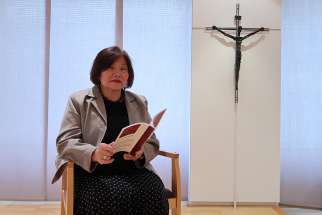Beauty matters
Passion, purpose, the poet and principal
Walking through the halls of Scarborough’s Mother Teresa Catholic Academy, Ontario’s first Poet Laureate, Randell Adjei, and principal Jose Alberto Flores feel a special connection to the diverse and dynamic school community.
Sr. Helena Burns: There is always a home waiting for us
The first haiku I ever wrote was about home. I was in sixth grade French class staring out the window as usual (zut alors!), and it came to me wholly formed, in a flash of insight.
Literary beauty shines through the gloom
If, as Dostoevsky said, beauty will save the world, then a young Somali-born Ontario Muslim mother and poet did her part on Oct. 30 to bring Canada closer to redemption.
“Promise to always be aware of the hearts around you
For all hearts are constantly
turning
According to the will of their Lord
And the one who hates today
Can surely love tomorrow”
Rowda Mohamud read from the stunningly gorgeous poem that won her the $10,000 poetry prize in the inaugural Ross and Davis Mitchell literary awards.
Only days after the debate over Muslim face coverings was again re-ignited with all its absurdities, its toxic mistrust, and all its mad claims of Canada’s imminent peril at the hands of some secret terrorist mothers pushing baby carriages, Mohamud stood on the stage at the Aga Khan Museum in Toronto and read from a place of deepest faith.
After a week when Catholics were viciously slandered as proto-rapists by no less than Alberta Premier Rachel Notley, and when the government of Ontario trampled the free speech rights of those who hold fast the sanctity of unborn life, Mohamud’s work spoke from the place of highest love, that is, of God.
She was one of four recipients of Mitchell literary prizes for writing that celebrates faith and shows how the sacred can illuminate words with goodness, truth and beauty. The awards were a Faith in Canada 150 initiative organized by the think tank Cardus (where I work) to ensure religious belief got its due during Canada’s sesquicentennial.
Cardus CEO Michael Van Pelt made clear during the Mitchell gala that the literary contest will continue well beyond 2017. Davis Mitchell, who with her late husband Ross made possible the $25,000 in prizes, said celebrating faith through literature struck close to her own work as a Christian spiritual director. The short stories and poems submitted “stirred my heart, and sometimes brought me to tears,” she said.
They did. Poet Shane Neilson, the runner up to Mohamud, read from his Loss Sonnets an achingly beautiful homage to his Catholic mother who lived and died devout in northern New Brunswick. Short story writer Susan Fish captured the vibrant mystery of baptism with Easter Water, while the $10,000 winner in the story category, Brandon Trotter, generated intriguing theological speculation with Saint 148 about a robot who yearns to pray to God.
Yet it was Mohamud, wearing what we have taken to referring as “traditional” Islamic head covering and dress, who most vividly and powerfully spoke to the way recovery of the transcendent through the literary will guide Canadians to heed the better angels of our spirit. Her long poem Please Find Yourself A Space was wrenching in its honesty about the fraught identities Muslim Canadians carry through their days in this country. But its constant turning to love of God, because God loves, was a message to the hearts of all of us about our duty to welcome the stranger as a child of God.
In the loving-warning voice of parent speaking to child, it says:
“Kiddo
Promise to always text when you leave home and get to your destinationEven if it’s broad daylight. Promise to always say your prayers of exit and return.
Promise to always text when you leave your destination and return home Even if it’s broad daylight.”
But then we hear this: “Promise to always say your prayers / For no advice benefits without prayers / Promise to stop and give the beggar his due / Even if it’s in the dead of night….”
Fear is safety. Fear is the politics of extreme caution, of daily doubt, self-protection, “even if it’s broad daylight.” But love? Love is the truest advice, given only in prayer. And love directs us to stop, to give, to open ourselves to the beggar even as we are unseen.
In these times of social rancor, these are the words that can bring us home. It is unimaginable we would heed them as mere political hectoring. No: only poetry, only story, only literature will do.
They are true, yes. Infinitely more, they are truth as saving beauty, found and founded in faith alone.
(Stockland is publisher of Convivium.ca and a senior fellow with Cardus.)
Poetry can open us to Church’s gifts
Jonathan recalled his conflict with a co-worker. In mid-sentence, he paused for a full minute, then said, “I’m not an angry person, am I? I don’t want to be an angry person.”
Why is it so difficult, sometimes, to acknowledge we’re angry? Even those of us who are pretty good at showing anger can find it hard to own. We might fear its power, or have experience of the ways anger can unleash terrible harm. Yet some Church Fathers thought anger existed in Paradise: could we imagine anger an unfallen, pure gift of God? A force that works within us, creatively rather than destructively?
Best Buy grant brings $20,000 for Beamsville school
Beamsville, Ont.'s St. John Catholic Elementary School is one of 12 schools from across the country that will enhance its technological capabilities thanks to a $20,000 grant from Best Buy Canada.
The money will be used to upgrade outdated technology at the school in the small town located just west of St. Catharines, Ont.
"We are very excited and we think it is going to be very beneficial to our students," said Michael Maiorano, Grade 5 teacher at St. John. "Technology is always going out and you always need new technology and we think that is beneficial to our students."
Deacon pens prayer through poetry
TORONTO - For Toronto Deacon Anthony Pignataro, penning poems is merely a form of prayer and service to others.
Writing poetry is “another way of serving others as you disseminate the work and share it,” he said.
Drawing from his ministry as a deacon and 20 years of “inspirational walks through his garden,” Pignataro has just published his first book of poetry, personal essays and meditations, From Under a Linden Tree, published by Sarum House.









